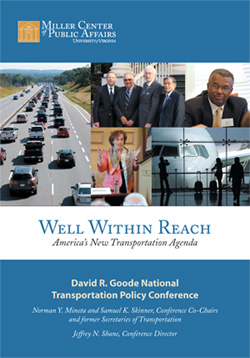
Two former secretaries of transportation stress renewed focus on infrastructure, better ways to pay for it
 Former secretaries of transportation Norman Mineta and Samuel Skinner want less talk on infrastructure and more action.
Former secretaries of transportation Norman Mineta and Samuel Skinner want less talk on infrastructure and more action.
The two have a working relationship that dates back to the early 1990s, when Mineta was a Democratic Congressman from San Jose serving as chair of the House Public Works and Transportation Committee, and Skinner was DOT Secretary under President George H.W. Bush. Mineta went on to head USDOT under President George W. Bush.
In a briefing on Capitol Hill yesterday, the duo called for increased attention on the nation’s infrastructure and declared the existing gas tax an insufficient funding source for the future.
“Transportation policy is very important in this country,” Mineta said. “It is the basis of everything that happens.”
Added Skinner: “We have to find new and creative ways to invest in infrastructure and generate the revenue to do so.”
Ashley Halsey of the Washington Post summarized some of the report’s key findings:
If Congress were to do the report’s bidding, the task would be far broader in scope than simply coming up with trillions of dollars in long-term funding to rebuild a 50-year-old highway system.
The experts also advocated adoption of a distinct capital spending plan for transportation, empowering state and local governments with authority to make choices now dictated from the federal level, continued development of high-speed rail systems better integrated with freight rail transportation, and expansion of intermodal policies rather than reliance on highways alone to move goods and people.
Mineta and Skinner’s bipartisan report also cited “nurturing livable communities” as a smart, needed strategy for reducing congestion and improving quality of life. They wrote:
Creating communities conducive to walking and alternative modes of transportation, especially in dense metropolitan areas, should be an important goal of transportation policy at all levels of government.
That a bipartisan duo of transportation secretaries, both of whom worked in Republican administrations, would cite livability and walkable communities as key goals for a 21st century transportation system speaks volumes. It tells us that there’s nothing partisan about getting out of traffic and getting home in time for dinner.
Ezra Klein, a Post staff writer and domestic politics blogger, echoed a similar theme over the weekend, pointing out that the low interest rates and cheaper construction and labor costs resulting from the recession present a unique opportunity to make needed infrastructure investments today at a massively reduced cost. “Delaying a dollar of needed infrastructure repairs is no different than racking up a dollar of debt,” Klein wrote. He goes on to affirm what we already know about the transportation spending process: it’s too political, not accountable, and Americans think it’s broken.
The problem is that the way we choose our infrastructure projects is an embarrassment. About 10 percent of infrastructure spending comes from politicians securing earmarks. Most of the rest depends on a formula in which the government just hands money over to the states. There’s no requirement for cost-benefit analysis or rate-of-return calculations. The decisions are horribly politicized.
If taxpayers are going to make a huge investment in our nation’s infrastructure, then we’re owed an assurance that policymakers are choosing the best projects. That suggests a grand bargain, in which more infrastructure money is tied to reforms ensuring a better process for spending that money.
The report, titled “Well Within Reach: America’s New Transportation Agenda,” was sponsored by the Miller Center for Public Affairs at the University of Virginia and can be downloaded in its entirely at the InfrastructureUSA website.



